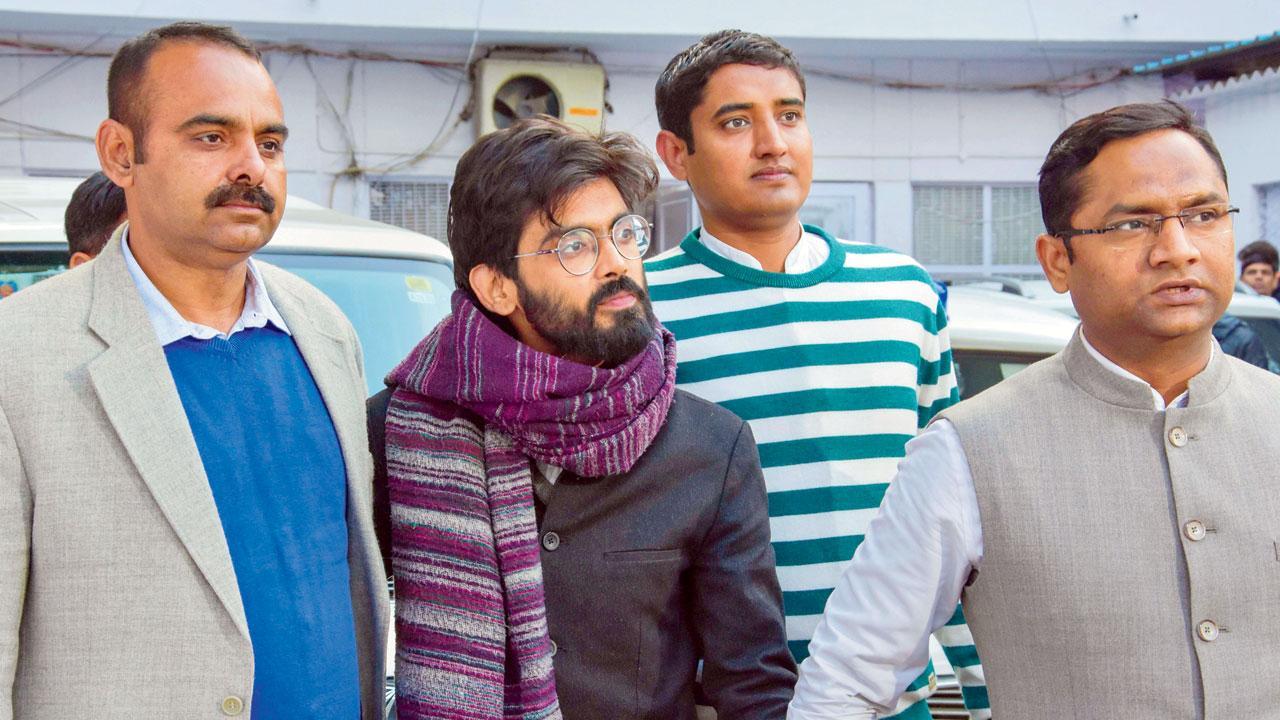Repressed by the State after he protested the Citizenship Amendment Act and having battled the Coronavirus in Guwahati Central Jail, the Ph.D student has grappled with all facets of the year of suffering.

Sharjeel Imam while being taken to court in New Delhi in January, 2020. File pic
Student leader Sharjeel Imam embodies the three themes emblematic of the year 2020, which has had citizens protest in fury, even as they dreaded death because of the Coronavirus pandemic and encountered the Indian state's repression. This misfortune is extraordinary for the 32-year-old Sharjeel, who lived the life of the mind until he drifted into the eye of the storm raging against the Citizenship Amendment Act.
ADVERTISEMENT
There can be little doubt about Sharjeel's sparkling brilliance: B. Tech and M. Tech in computer science from Indian Institute of Technology, Bombay; two years of work experience in Bengaluru; MA in history from Jawaharlal Nehru University, Delhi; M. Phil on the exodus of Muslims from Bihar in 1946; his pending Ph.D thesis will track the link between cow-slaughter and communal conflict.
The sparklingly brilliant perceive the structures of injustice not readily visible to others. The few among them who have empathy are inspired to become persons of action, their awakening subjecting them to misery as they stake out a position against the state, which brooks no challenge. Sharjeel's insights, however, arrayed him against not just the state and the Hindu Right, but also, unforgivably, against India's entire ideological spectrum.
In a speech Sharjeel delivered, on January 16, at Aligarh Muslim University, he cited the backwardness of Muslims and the communal carnages they endured to claim they had been constantly betrayed by all. He wondered whether the Indian Constitution could be called secular as it denied reservations to those who convert from Hinduism to Islam and Christianity. He called Mahatma Gandhi a fascist for going on a fast to deprive Dalits, through the 1932 Poona Pact, the right to elect their own leaders.
Muslims cannot hope for justice from those whose privileges arise from an unjust order. Their hope, he said, lay in organising themselves to mount pressure on the state to withdraw the CAA. Conscionable Hindus were welcome to join the protest of Muslims, but they must function under a Muslim leadership, without demanding the eschewing of Islamic slogans such as Allah Is Great, without diluting the Muslim character of their resistance.
His swipe at the totems of nationalism had already isolated him from civil society groups and segments of Muslims, even though his critique echoed — cockily and erroneously at times — views of theorists belonging to different ideological persuasions. He became a pariah overnight, as a Bharatiya Janata Party spokesperson plucked out 40 seconds of his hour-long speech to portray he wanted to dismember India. In those 40 seconds, Sharjeel had said Muslims could organise a chakka jam to cut off Assam from the rest of India. Only then the state would listen to them.
Five States, including Assam, filed FIRs against Sharjeel for sedition. He was now the state's quarry, even though the Supreme Court had ruled, in 1962, that no speech could be treated as seditious unless it incited violence. On February 18, Sharjeel was taken to Guwahati, handcuffed, surrounded by commandos, gawked at for threatening to dismember India. "I felt like an exotic animal in a zoo," Sharjeel told his counsel, Ahmad Ibrahim.
Sinister stares haunted Sharjeel at Guwahati Central Jail, where he awaited bail, until the inmates realised he was not a terrorist but a bookworm inclined to spending all his time in the prison library. His discovery of the peace of prison was shattered as Coronavirus swept through Guwahati Central Jail. On testing positive for it, Sharjeel was assigned to the barrack reserved for the infected. He dreaded death as some of his mates groaned with pain, fever and struggled to breathe. "I will not come out alive," Sharjeel would tell Ahmad.
He turned negative a month later, only to be whisked away to the Capital, where he was among those charge-sheeted under the Unlawful Activities (Prevention) Act (UAPA). Back on the train, in handcuffs, with commandos. The state enjoys magical powers to turn scholars into exotica. Sharjeel has become an addition to his own list of examples testifying to the oppression of Muslims. Does he, in his cell in Tihar Jail, wonder why those who preside over pogroms against Muslims are never booked under UAPA? Will he abandon his Ph.D thesis to write on India's Islamophobia, of which he is decidedly a victim?
Sharjeel's friends quote political philosopher Hannah Arendt, who famously said, "If one is attacked as a Jew, one must defend oneself as a Jew. Not as a German, not as a world-citizen, not as an upholder of the Rights of Man." Likewise, Sharjeel had wanted Muslims to defend themselves as Muslim, as they had been attacked for their religious identity. He ran into the hypocrisy of those who object to Islamic slogans but not to the chanting of Jai Bhim, Jai Siya Ram or its masculine variant Jai Sri Ram, or Jo Bole So Nihal Sat Sri Akal. They cannot fathom the widespread nervousness over the desire of Muslims to have their own leadership, even as subaltern stirrings are read in the politics of caste mobilisation. The cure for phobias does not lie in acquiescence. Nor in banishing the victims of phobias to jail. Goodbye, the year of suffering – for us and Sharjeel.
The writer is a senior journalist
Send your feedback to mailbag@mid-day.com
The views expressed in this column are the individual's and don't represent those of the paper
 Subscribe today by clicking the link and stay updated with the latest news!" Click here!
Subscribe today by clicking the link and stay updated with the latest news!" Click here!






